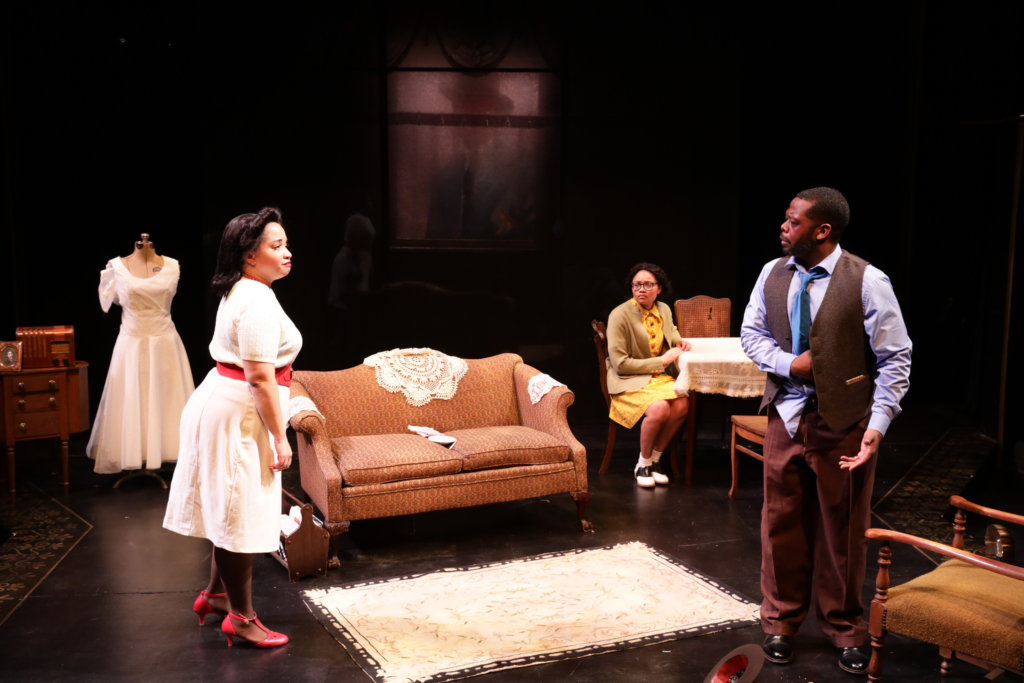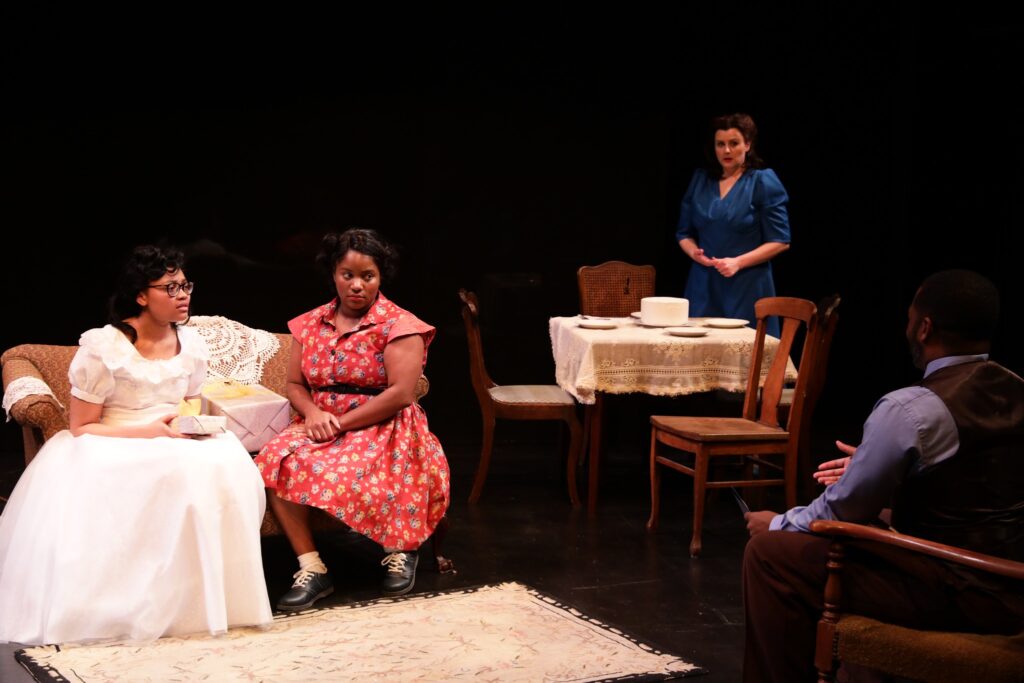
Thomika Marie Bridwell, Madison Margaret Clark and Dominic Carter. Photo by Mark S. Howard.
Presented by The Lyric Stage Company of Boston
By Lynn Nottage
Directed by Tasia A. Jones
Scenic Design by Cristina Todesco
Costume Design by Mikayla Reid
Lighting Design by Eduardo Ramirez
Sound Design by Aubrey Dube
Props Design by Lauren Corcuera
Stage Managed by Nerys Powell
Assistant Stage Managed by Ally MacLean
Voice & Dialect Coached by Allison Beauregard
January 10 – February 2, 2025
The Lyric Stage Company of Boston
Boston, MA 02116
Online playbill
Critique by Helen Ganley
BOSTON — The syncopated groove of Ms. Lauryn Hill’s “Everything is Everything” sweeps over the audience, settling like gossamer smoke over the sepia toned Victorian archway of a Brooklyn apartment. A young Black girl in a simple yellow dress and worn saddle shoes stands at the center of this accommodation, guiding us through the memories of her time there. In this way, the Lyric Stage Company of Boston’s production of Crumbs from the Table of Joy intertwines grief, divinity, expectations, and family, unfolding like a silver screen storyboard that leaves us feeling changed.
Lynn Nottage’s Crumbs from the Table of Joy, first produced in 1995, is a heartfelt drama set in 1950s Brooklyn. It follows the Crump family’s struggles after moving from the South following the death of their mother as teenage Ernestine narrates their challenges with racial identity, faith, and family dynamics. Her father, Godfrey (Dominic Carter), becomes devoted to a religious leader, while her radical Aunt Lily Ann Green (Thomika Marie Bridwell) and (spoilers!) his sudden marriage to a white German immigrant, Gerte (Bridgette Hayes), upend their lives further. Blending humor and social commentary, the play explores race, class, and the American Dream.
At the center of the show is Madison Margaret Clark as Ernestine Crump. At its core, this show is a memory play, drawn up and pieced together from Ernestine’s memories. Clark masterfully steps in and out of the action, portraying the obedient daughter in her memories, and punctuating the scenes with omniscient and matured asides that reflect on the events as they occurred. Easily maneuvering between rhotic and non-rhotic accents, Clark shines as the show’s driving force.
As Ermina Crump, Catia embodied the rebellious younger sister. Full of sass, Catia’s exaggerated physical comedy (complete with huffily crossed arms, flirtatious wiggling fingers, and a face full of pain and distrust as a hot comb is taken to her kitchen) brings a breath of levity to the production.
We can all remember the times when we realized that the adults in our lives were, at their core, only human. A trio of adults, each with their own beliefs and pitfalls, influenced the lives of the Crump girls: their father Godfrey Crump (Dominic Carter), their Aunt Lilly Ann Green (Thomika Marie Bridwell), and their stepmother Gerte Schulte (Bridgette Hayes).
Carter strutted across the stage, preaching the words of Father Divine with a bassy certitude as Godfrey. This character is innately in conflict with his need for divinity to soothe his grief and the nature of that divinity potentially depriving his children. Carter somewhat encapsulates this conflict, breezing over some poignant moments throughout the production.

Madison Margaret Clark, Catia and Bridgette Hayes. Photo by Mark S. Howard.
Juxtaposing Godfrey’s passionless life is Lily Ann Green who is addicted to the vices that life has to offer. Bridwell is robust and powerful, drawing attention with each word, embodying the complicated concoction of obstinance, indignance, and resignation.
Finally, Gerte arrived in the storyline, her lilting German accent tinged with pleas for affection. Hayes delivers a line that resonates in the aughts as much as in the 50s: “When I see you, I see no color.” This anachronistic phrase circulates even today after the racial reckoning in 2020, embodying privilege and the discomfort of many white Americans when it comes to discussions of race. Hayes and Bridwell’s conversation on the topic is poignant and powerful, especially relevant with the political changes facing Americans in just a few days.
Technically, the show was immaculate. Cristina Todesco’s scenic design paired with Sarabeth Spector’s props created gradual change in the small apartment, introducing new furniture and accoutrements to the space. Eduardo Ramirez’s lighting design created distinct movie scene vignettes, and Aubrey Dube’s sound design was perfectly timed to the volume knob on the radio. Mikayla Reid’s costume design personified the distinct differences between characters, including city-slicking fashions, freshly shined shoes, and a beautiful white gown.
The phrase itself, “Crumbs from the Table of Joy,” is evocative – scrounging for specks of happiness in times that might be devoid of it. The Lyric Stage Company of Boston’s production emphasizes the importance of celebrating every moment of triumph, that memories need maintenance, and that nonconformity can in and of itself be revolutionary.
Updates: The props designer is Lauren Corcuera; Thomika Marie Bridwell plays character Aunt Lily Ann Green.
